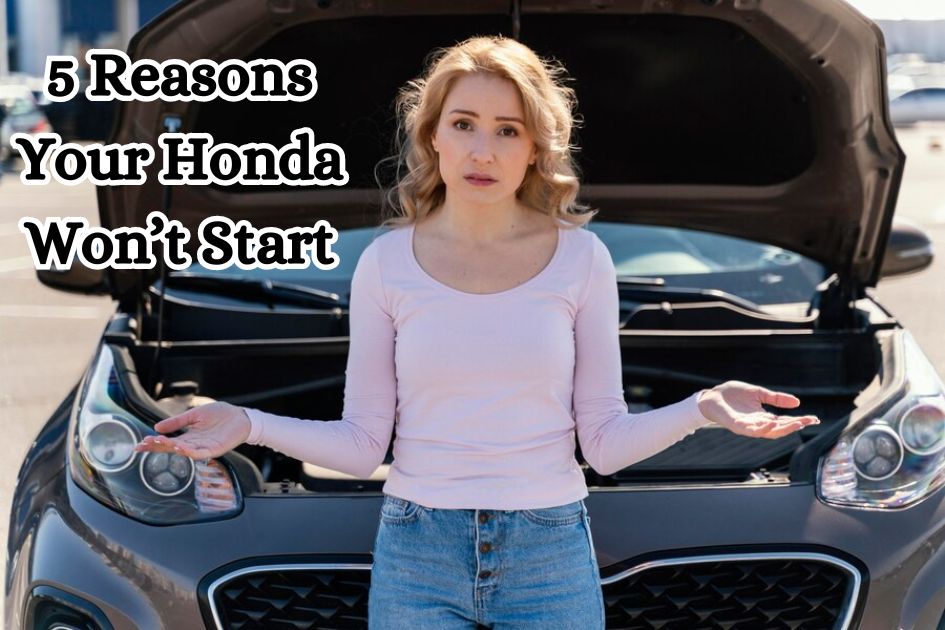There’s nothing more frustrating than turning the key in your Honda’s ignition only to have the engine fail to start. You’re left stranded, wondering what the issue could be and how to resolve it quickly.
Don’t panic! While a no-start situation can be inconvenient, it’s often due to a few common culprits. In this comprehensive guide, we’ll explore the top five reasons your Honda might not start, providing you with valuable insights to help you get back on the road swiftly.
From battery troubles to fuel system hiccups, we’ll break down each potential cause, empowering you with the knowledge to handle these situations confidently.
1. Battery Issues
Batteries are the lifeblood of your Honda’s electrical system, and a faulty one is likely the primary reason your vehicle won’t start. Several factors can contribute to battery issues, including:
- Age: Most automotive batteries have a lifespan of 3-5 years. As they age, their ability to hold a charge diminishes, making it harder for your Honda to crank over.
- Corrosion: The battery terminals can corrode over time due to exposure to moisture and atmospheric conditions, hampering the flow of electricity.
- Parasitic Drain: Electrical components that continue to draw power even when your Honda is turned off can drain the battery, leaving you stranded.
Troubleshooting battery issues is relatively straightforward. Start by inspecting the battery for any visible signs of damage, corrosion, or leakage. If the battery appears fine, you can attempt a jump-start. If the jump-start is successful, it may indicate a charging system problem, which could be related to the alternator (more on that later).
However, if a jump-start doesn’t work, it’s likely time to replace the battery. Investing in a high-quality battery from a reputable brand can save you the hassle of frequent replacements and ensure your Honda starts reliably every time.
2. Bad Alternator
While a weak battery is often the culprit, a faulty alternator can also leave you stranded. The alternator is responsible for charging your Honda’s battery while the engine is running and supplying power to the electrical system.
Signs of a bad alternator include:
- Dim headlights or interior lights, even with the engine running
- Battery frequently depleting or needing to be jumped
- Electrical accessories (radio, power windows, etc.) not functioning properly
Alternators can fail due to various reasons, such as worn-out brushes, damaged bearings, or a faulty voltage regulator. If you suspect your alternator is the issue, it’s best to have it tested by a professional at your nearest Honda service department.
Replacing a faulty alternator is crucial, as a well-functioning one ensures your battery stays charged and your Honda’s electrical components operate correctly.
Neglecting an alternator problem can lead to more significant issues down the line, such as a drained battery or even potential damage to other electrical components.
3. Bad Starter
The starter is the component responsible for initiating the engine’s cranking process when you turn the key. If your Honda’s engine doesn’t crank or make any sound when you try to start it, the starter motor could be the culprit.
Starters can fail due to various reasons, including:
- Worn-out brushes or bearings
- Faulty solenoid or electrical connections
- Excessive heat or moisture exposure
Common symptoms of a bad starter include:
- Clicking or grinding noise when trying to start the engine
- Engine doesn’t crank or make any sound when the key is turned
- Intermittent starting issues
If you suspect a starter problem, it’s best to have it diagnosed by a professional at a Honda service department. Attempting to repair or replace the starter yourself can be challenging, as it often requires removing other components for access.
Replacing a faulty starter is essential for ensuring your Honda starts reliably every time. Neglecting a starter issue can leave you stranded and potentially cause further damage to other components if the starter fails completely.
4. Weak Key Fob Battery
For Honda models with keyless entry and push-button start, a weak key fob battery can prevent your vehicle from starting. The key fob communicates with your Honda’s computer system to allow the engine to start, and a depleted battery can disrupt this communication.
Signs of a weak key fob battery include:
- Diminishing range when trying to unlock or lock your Honda
- Difficulty starting the engine with the push-button start
- Warning lights or messages on the dash indicating a key fob issue
Replacing the key fob battery is a simple and inexpensive fix. Consult your Honda’s owner’s manual for instructions on replacing the battery or visit a Honda service department for assistance.
It’s essential to address a weak key fob battery promptly, as a completely drained battery can leave you stranded and unable to start your Honda. Regular battery replacements (typically every 2-3 years) can prevent this inconvenience.
5. Clogged Fuel Filter
While less common, a clogged fuel filter can also prevent your Honda from starting. The fuel filter is responsible for removing contaminants and debris from the fuel before it reaches the engine, ensuring a clean and consistent fuel supply.
Over time, the fuel filter can become clogged with dirt, rust, and other impurities, restricting the fuel flow and potentially causing starting issues. Other symptoms of a clogged fuel filter include:
- Engine misfiring or running rough
- Decreased fuel efficiency
- Engine stalling or hesitating during acceleration
Replacing the fuel filter is a relatively inexpensive maintenance task that should be performed regularly, typically every 30,000 to 50,000 miles, depending on your Honda’s recommended service schedule.
Neglecting a clogged fuel filter can not only cause starting issues but also lead to potential damage to other fuel system components, such as the fuel pump or injectors. Addressing this issue promptly can prevent more costly repairs down the line.
| Component | Function | Potential Issues | Symptoms |
| Battery | Provides electrical power to start the engine and power accessories | Age, corrosion, parasitic drain | Engine won’t crank, dim lights, electrical issues |
| Alternator | Charges the battery and powers electrical system while running | Worn brushes, faulty voltage regulator | Battery drains quickly, electrical accessories malfunction |
| Starter | Initiates the engine cranking process | Worn brushes, faulty solenoid | Clicking noise, engine doesn’t crank |
| Key Fob | Enables push-button start | Weak battery | Difficulty starting, warning lights |
| Fuel Filter | Removes contaminants from fuel | Clogged | Engine misfiring, decreased fuel efficiency |
FAQ’s
What would cause a Honda not to start?
There are several potential reasons why a Honda might not start:
- Dead or faulty battery
- Bad alternator not charging the battery
- Faulty starter motor preventing engine from cranking
- Weak or dead key fob battery (for push-button start models)
- Clogged fuel filter restricting fuel flow
Why is my Honda turning over but not starting?
If your Honda’s engine is cranking but not starting, it could be due to issues with the fuel system (clogged fuel filter, faulty fuel pump), ignition system (faulty spark plugs, ignition coils), or other engine components (sensor issues, timing belt problems).
Why is my car suddenly not starting?
A sudden no-start issue can be caused by various factors, such as a dead battery, faulty alternator, bad starter motor, or other electrical or mechanical problems. It’s essential to diagnose the root cause promptly to avoid being stranded.
Why won’t my car start but I have power?
If your car has electrical power (lights, radio, etc.) but won’t start, it could be due to a faulty starter motor, issues with the ignition system, or other mechanical problems preventing the engine from cranking over.
How to fix a car not starting?
To fix a car that won’t start, you should:
- Check the battery and clean any corrosion on the terminals
- Attempt a jump-start to rule out a dead battery
- Inspect the alternator and starter for any signs of failure
- Check the key fob battery (if applicable)
- If the issue persists, have a professional diagnose and repair the underlying cause
You may also like:
How Eco-Friendly Is The Upcoming Honda Odyssey Hybrid?
Final Thoughts
A no-start situation with your Honda can be incredibly frustrating, but understanding the most common causes can help you troubleshoot the issue effectively.
Whether it’s a dead battery, failed alternator, faulty starter motor, weak key fob battery, or clogged fuel filter, addressing these problems promptly is crucial.
Don’t let a no-start problem catch you off guard – keep this guide handy, and you’ll be equipped to handle any of these top five culprits confidently. Regular maintenance and timely repairs are key to ensuring your Honda starts reliably every time, keeping you on the road and your plans on track.

